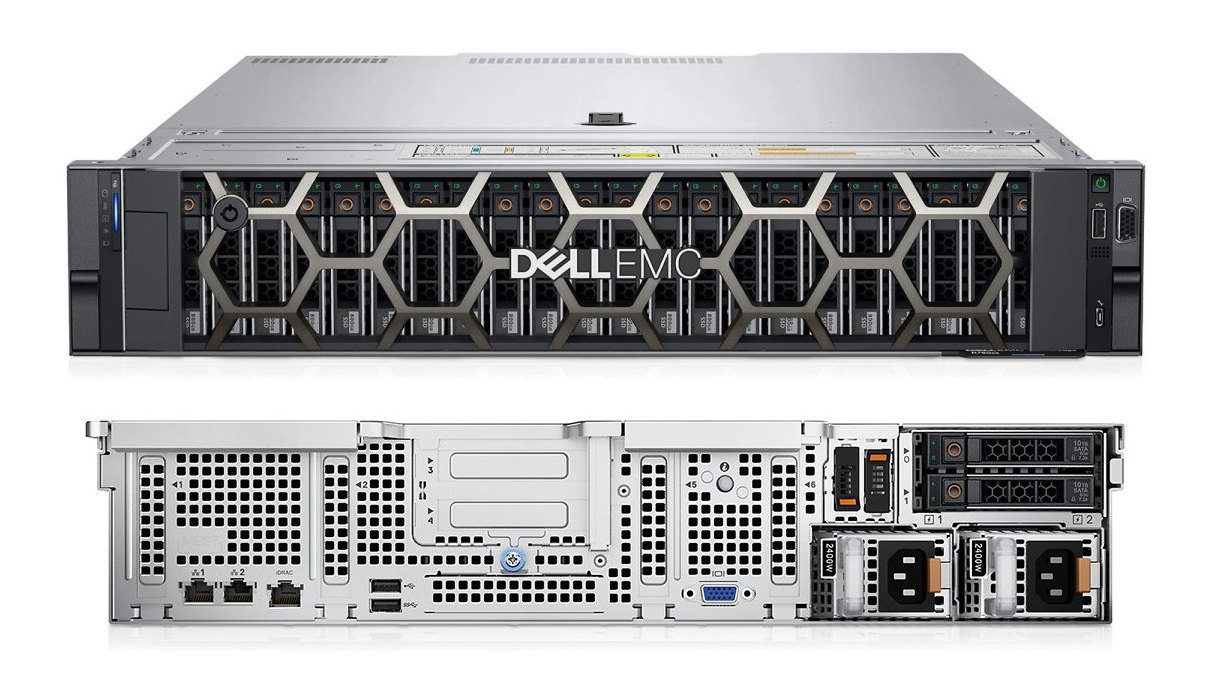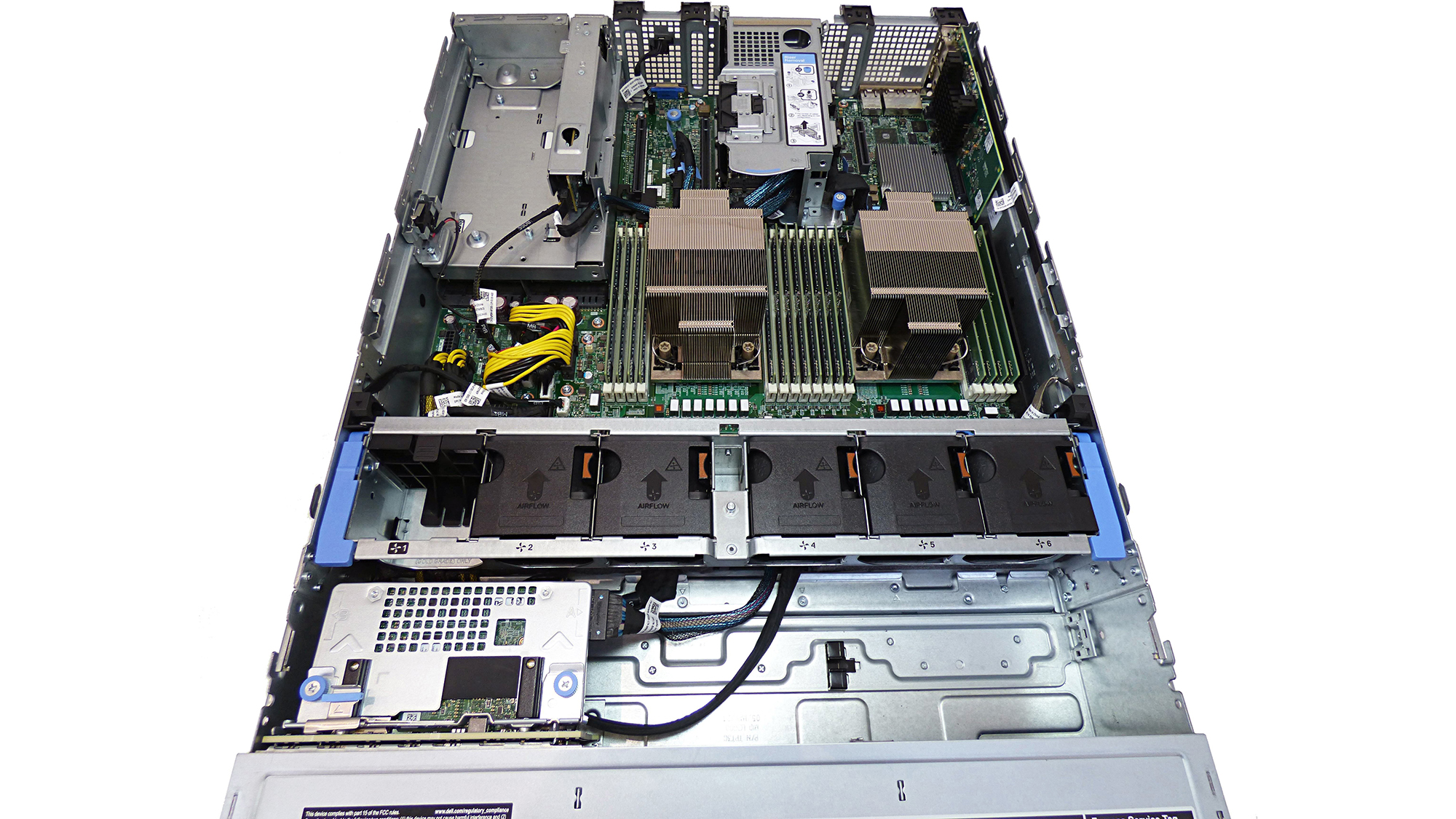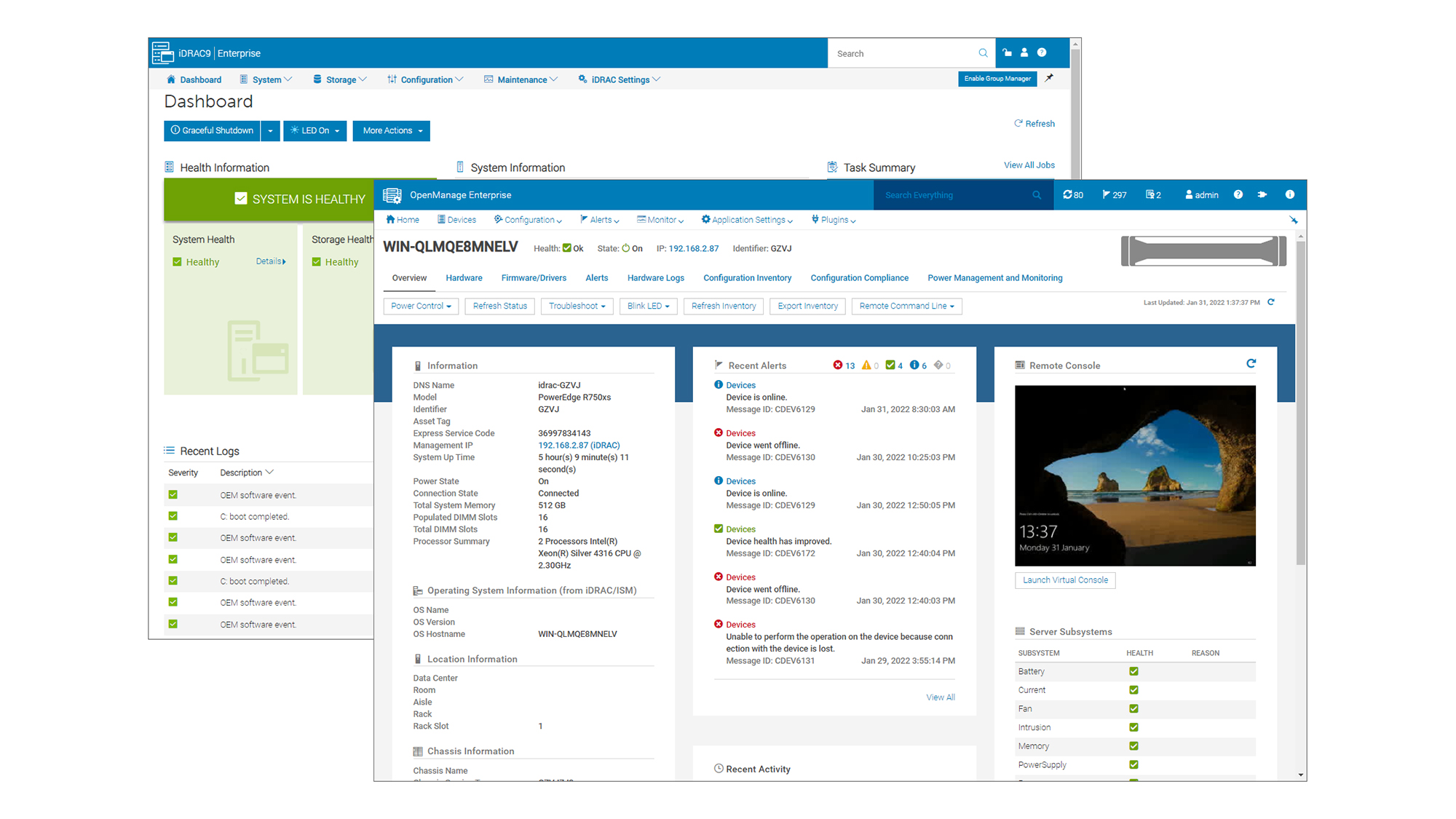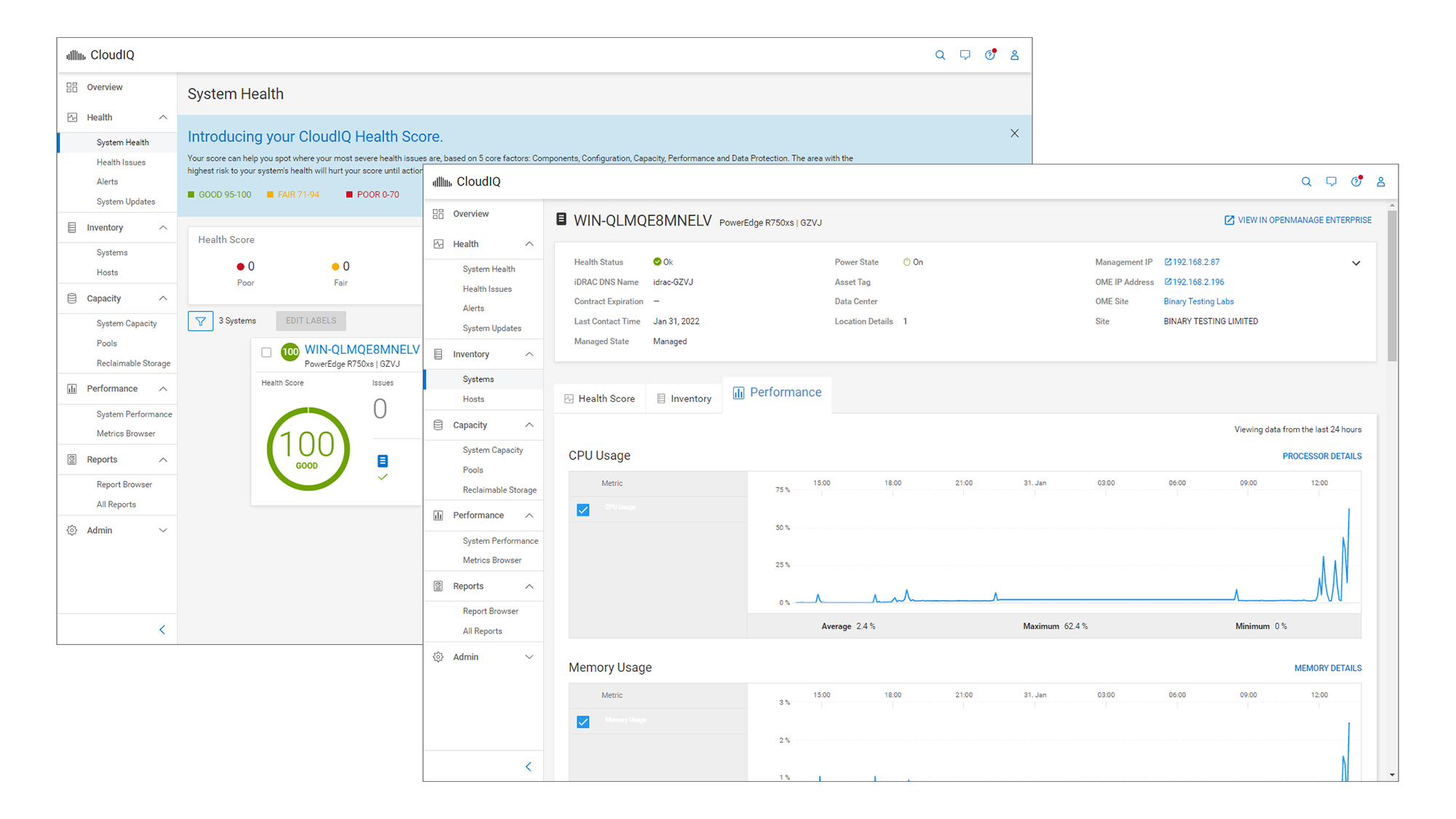Dell EMC PowerEdge R750xs review: A pocket-friendly power plant
The PowerEdge R750xs offers a surprisingly powerful rack package at a tempting price


-
+
Great value
-
+
Support for 32-core Xeon Scalable CPUs
-
+
Impressive expansion potential
-
+
Excellent server management tools
-
+
CloudIQ

As one of the first Gen3 Xeon Scalable servers to market, Dell EMC’s PowerEdge R750 set a very high standard and impressed us mightily when we exclusively reviewed it at its launch. It packs a truly remarkable specification into its 2U of rack height and offers a huge expansion potential as well.
The only issue with the R750 is it could be overkill for businesses that have more modest rack server requirements, as they could end up paying for features their workloads may never use. Not everyone needs core-heavy Xeon Scalable Platinum CPUs, a massive 8TB of system memory, Intel PMEM 200 modules or liquid-cooling, after all.
Enter the PowerEdge R750xs, which is designed for businesses that don’t need such a high-end specification, taking a lot of the goodness from the R750 and offering it as a more cost-optimised version. Along with large server scale-out projects, the R750xs targets more general customer workloads such as databases, virtualization, VDI and cloud services.
Dell EMC PowerEdge R750xs review: Hardware features
If you think the R750xs is a ‘hobbled’ version of the R750, you’d be very wrong. For starters, it can handle all Gen3 Xeon Scalable Gold CPUs right up to the 32-core 6338/6338N models and the price for our system includes a very serviceable pair of 20-core 2.3GHz Xeon Scalable Silver 4316 CPUs.
Dell EMC found many of its customers aren’t buying more than 1TB of memory, so that’s what the R750xs will support and our system came decked out with a healthy 512GB of DDR4 RDIMM memory spread across all 16 of its DIMM slots. Only those with very specific workloads and deep pockets would likely specify Intel Optane Persistent Memory, so support for these has been removed from the R750xs as well.

Further research found that only a small number of customers were buying more than 12 drives, so storage arrangements see some changes too. A quick glance at the front shows the R750xs on review retains the same 8+8+8 drive bay layout as the R750 - but options extend to 16 SFF SAS/SATA devices, with the third bay set aside for those that want NVMe SSDs.
If you need more room to maneuver, you can also specify either 8 or 12 LFF front drive bays, and an optional rear two-bay cage is available which supports HDDs and NVMe SSDs. This is in contrast to the R750, which supports two rear cages. Our server also has Dell EMC’s BOSS (boot optimized storage solution) S2 card which presents its two M.2 slots at the rear, with 480GB SATA SSDs fitted in removable hot-swap carriers for easy access.
Sign up today and you will receive a free copy of our Future Focus 2025 report - the leading guidance on AI, cybersecurity and other IT challenges as per 700+ senior executives
Dell EMC PowerEdge R750xs review: Chassis design
The R750xs chassis is slightly shorter than its big brother and has a different internal design. Whereas the R750 employs a T-shaped motherboard which allows its PSUs to be placed on each side of the chassis for improved cooling, the R750xs keeps the older design, with the dual PSUs installed in one rear bay to the left.
Cooling isn’t a problem though, as the server is available with five standard hot-plug fan modules which can handle CPUs up to a 150W TDP. Higher specified systems require either Silver or Gold high-performance fans and there’s a sixth bay which will be fitted with an extra fan module if the rear drive cage is installed.
Expansion doesn’t see any major restrictions as the R750xs supports up to six PCI-E Gen 4 half-length, half-height cards with an OCP 3 edge connector lurking beneath the central 2-slot riser. The price of our system includes an Intel X710 dual-port 10GbE SFP+ OCP 3 card with Dell EMC also offering 10/25GbE mezzanine cards.
Dell EMC PowerEdge R750xs review: Management and CloudIQ

Remote server management is as excellent as we’ve come to expect from Dell EMC, and the server’s iDRAC9 controller offers a feast of features presented in its tidy web console. You can keep a close eye on all aspects of server operations, view performance, remotely configure RAID arrays and directly access its BIOS menus.
Dell EMC’s OpenManage Enterprise (OME) server provides a web console for managing all your servers, with the Power Manager plug-in adding system consumption and thermal monitoring. The free CloudIQ cloud hosted service goes even further by using machine learning to deliver server telemetry and predictive analytics for your entire Dell EMC infrastructure.
To use CloudIQ, we added its plug-in to our OME on-site installation, generated an access code and PIN and selected the OME device groups we wanted monitored. OME functions as a collector for CloudIQ, sending telemetry and alert logs to it every 15 minutes, and the only criteria for servers is they must have a valid support contract.
The CloudIQ portal opens with an overview of all monitored servers, storage arrays and switches, shows system health status and alerts while the cybersecurity feature identifies potential security violations. CloudIQ performs predictive analysis on storage pools and clusters and provides historical trending and timely warnings as to when capacities are likely to reach their limits.
Plenty of information was provided for our R750xs review server including a proactive health score, detailed lists of all hardware components and a 24-hour performance view for CPU and memory utilisation, power consumption and temperatures. The system performance page presents views of system level performance for all monitored devices which can be customized with filters while the reports section allowed us to create custom dashboards showing graphs and tables for selected server metrics.

Dell EMC PowerEdge R750xs review: Verdict
Businesses that want an affordable 2U rack server without all the extra bells and whistles will find Dell EMC’s PowerEdge R750xs fits the bill nicely. With support extending to all Gen 3 Xeon Scalable Gold CPUs and up to 1TB of memory, it’s capable of handling virtually any general-purpose workload, storage and expansion potential are both equally good and the system on review offers a fine specification for the price.
Dell EMC PowerEdge R750xs specifications (as reviewed)
| Chassis | 2U rack |
| CPU | 2 x 20-core 2.3GHz Intel Xeon Scalable Silver 4316 |
| Memory | 512GB 2,667MHz ECC DDR4 |
| Storage bays | 8 x hot-swap SFF (max. 26 with rear bay) |
| RAID | Dell PERC H755 front SAS |
| Storage included | 5 x 960GB SAS3 SSDs |
| Other Storage | Dell BOSS-S2 with 2 x 480GB M.2 SATA SSDs |
| Network | 2 x Gigabit LOM, Intel X710 10GbE 2P SFP+ OCP 3 |
| Expansion | 6 x PCI-E 4 slots, 1 x OCP 3 edge slot |
| Power | 2 x 1,400W Platinum hot-plug PSUs |
| Management | Dell iDRAC9 Enterprise |
| Warranty | 3Yr Standard On-Site NBD |
Dave is an IT consultant and freelance journalist specialising in hands-on reviews of computer networking products covering all market sectors from small businesses to enterprises. Founder of Binary Testing Ltd – the UK’s premier independent network testing laboratory - Dave has over 45 years of experience in the IT industry.
Dave has produced many thousands of in-depth business networking product reviews from his lab which have been reproduced globally. Writing for ITPro and its sister title, PC Pro, he covers all areas of business IT infrastructure, including servers, storage, network security, data protection, cloud, infrastructure and services.
-
 CISOs are keen on agentic AI, but they’re not going all-in yet
CISOs are keen on agentic AI, but they’re not going all-in yetNews Many security leaders face acute talent shortages and are looking to upskill workers
By Emma Woollacott Published
-
 Why Amazon’s ‘go build it’ AI strategy aligns with OpenAI’s big enterprise push
Why Amazon’s ‘go build it’ AI strategy aligns with OpenAI’s big enterprise pushNews OpenAI and Amazon are both vying to offer customers DIY-style AI development services
By Ross Kelly Published
-
 Cyber resilience tunnel vision is leaving enterprises open to external threats
Cyber resilience tunnel vision is leaving enterprises open to external threatsNews Many enterprises are overlooking supply chain risks as part of their cyber resilience strategies
By Emma Woollacott Published
